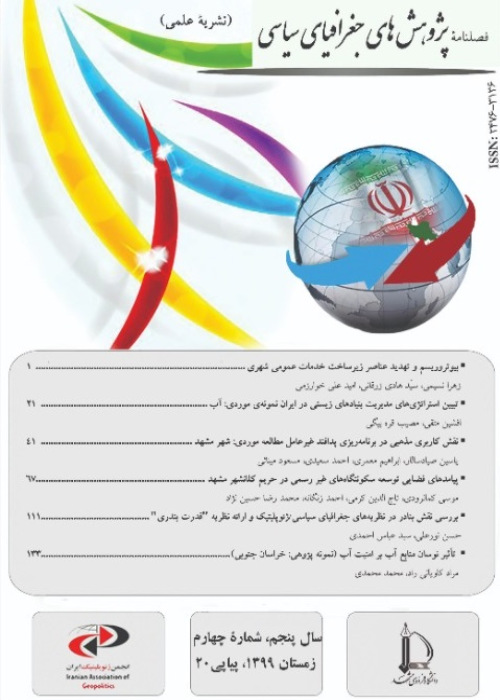Objectivity and validity in geography with Emphasizing on Political Geography
The final objective of social sciences is to seek objective truth, so scientists are seeking realism in science, and this is a term that one of its meanings implies the "objective" conception of reality. Thus, the most fundamental problem in methodology for scientists is that what is objectivity? How can one integrate objectivity in the process of knowing the facts, realities and coincidence of these matters together? How can one set aside a biased notion? The most important issue of any type of epistemology and science is to create a balance between objectivity and subjectivity in science. If an objective experiment does not lead to subjective and methodical rules and laws, then science and knowledge will not be formed, and if subjective rules and laws cut out from the objective reality, realism will be lost. In the other words, the central axis of the questions of epistemology is the "value of cognition", and this seeks to show that what is the criterion of identifying "facts" from false and contradictory ideas to reality? According to the above, objectivity and validity in various sciences, including geography, are of fundamental positions, and different geographic schools have taken different positions in this regard, which directly relate to the results of the research. In this paper, we are seeking to find out what are positions of methodology schools in geography in relation to objectivity and validity of geographic propositions? What are conclusions given to these positions? Which position can have a scientific position in geography? In this paper, we have tried to emphasize political geography in various propositions.
Objectivity, an attribute of thought at the time that this thought is true. When the objectivity of scientific propositions, spoken, it can be applied in three meanings: 1. correspondence with reality; 2. The possibility of universal evaluate and judge; and 3. Free from personal values, presuppositions and beliefs. The scientific method has three stages of Problem-finding, theorizing, and validation. In between, the criteria for validating propositions and statements are correspondence with reality and logical compatibility. The purpose of logical compatibility is reasonableness, harmony, cohesion and consistency, and ultimately the compatibility of propositions and statements with rational and logical principles, is such that it is acceptable to the minds, clear and self-evident. The validation of theories in the field of empirical sciences (such as geography) is posterior, and theories are inductively endorsed with a degree of probability, rather than deductive proof.Some of the studies that have focused on the problem of "objectivity and validity" include some articles and books such as Biyabanki, M. “At Interpretation of objectivity; look at the position of objectivity of scientific propositions in various schools of philosophy of science” (2012); Dirbaz, A. “Scientific objectivity and religious attitude” (1998); and Shiroudi, M. “Validation of Hermeneutic Methodology in the Humanities and Islamic Sciences” (2013). The books of Dr. Soroush such as (What is Science? What is Philosophy?, Knowledge and Value, A lecture on Philosophy of Science- Society), and works by Karl Popper, such as Realism and the aim of Science and the Book of The Logic Of Scientific Discovery can also be mentioned.
The present research, due to its philosophical and logical nature, is classified under the theoretical and fundamental research. This research is based on a descriptive-analytical (logical) method and the topics and contents of this collection are documentary and library type.
In this paper, various schools of positivism, hermeneutics, phenomenology, Frankfurt, postmodern, and post-structuralism were examined in terms of objectivity and validity of geographic propositions, and it was shown that since critical schools finally lead to relativism, they do not endorse objectivity and validity of geographic propositions, and in this respect they face the problems of epistemology. Finally, it was shown that geographic realities and their recognition as well as evaluation and determination of accuracy or inaccuracy of these hypotheses will be possible through realistic and precise research within the hypothetical-deductive method and rational-empirical approach.
According to the results of this paper, the concept of objectivity in geography can be considered from three perspectives: 1. Although geography is one of the validity sciences and geographic concepts have a valid and abstract position, the above-mentioned phenomena and concepts are objective and realistic out of mind, and phenomena such as vegetation of gardens, roads, bridges and buildings, farms, villages, cities and other geographic phenomena of the same valid nature are objective and real phenomenon. 2. The other meaning of objectivity of geography as an empirical science is that geographic research is a general and universal, and the study of geographic phenomena, hypotheses, and theories is not considered to be monopolistic or individual but is available to all researchers. All geographers are able to examine, for example, the relationship between the Earth's rotation and transition around the sun, with the advent of the night and day, and the various seasons, and / or the possibility of examining the relationship between the geographical location of each area and its climatic conditions, causes of various geographic perspectives, and etc., available to all geographical researchers; and 3. As with other empirical sciences, geographic studies in order to evaluate and judge geographic hypotheses and theories use objective criteria independent of the subjectivity of individuals. These criteria, which are the same criteria for validation in science, are based on a realistic approach that includes the following two principles: a) the principle of correspondence with reality and b) the principle of compatibility with the foundations of reason and logical compatibility. Therefore, briefly, it can be said that the meaning and validity of geographic propositions are as follows: 1. The real and objective nature of geographical phenomena and processes, and propositions about them; 2. Publicity and universality of geographic research; and 3. Determine the value and validity of geographic hypotheses, propositions and theories by adapting them to the criteria of "reality" and "rational compatibility".
- حق عضویت دریافتی صرف حمایت از نشریات عضو و نگهداری، تکمیل و توسعه مگیران میشود.
- پرداخت حق اشتراک و دانلود مقالات اجازه بازنشر آن در سایر رسانههای چاپی و دیجیتال را به کاربر نمیدهد.



